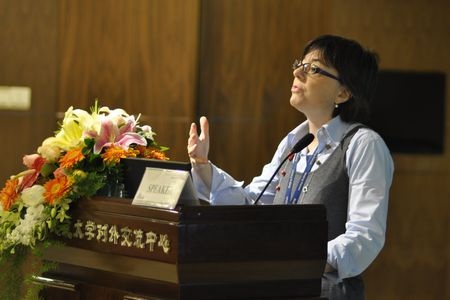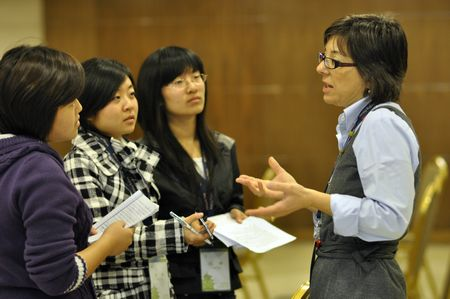Peking University, Nov. 6, 2010: On Nov. 6, Session 2 of “Global Governance and the Role of China” was held at Yingjie Overseas Exchange Center at Peking University, centering on the theme of “Global Governance and Economic Development.” After the discussion, journalists from PKU News had the honor to interview Paola Subacchi, a renowned economist from Britain.


Paola Subacchi at Beijing Forum 2010 (PKU News/Meng Shiguang)
Q: Do you think China’s quick development is a threat to other countries and to the global safety?
A: I don’t think there’s any problem with the development of China, but I’d rather put it as a very fast growth rather than development. It is very striking about China in the past fifty years. It is a very strong growth, along with its coming out of the crisis. Development is a long process, and it’s very important. I don’t think there’s any issue about security unless China makes any shot. China actually is a very positive model that holds attractions to other countries. It has been a larger supply chain in Asia after coming out of the economic crisis.
Q: As is known to all, more and more pressure has been putting on the appreciation of RMB, but China's Ministry of Commerce asserted that the exchange rate of RMB had nothing to do with the unbalanced international trade. What do you think of it?
A: This issue is much more complicated. It is not only an issue of trade. It is an issue of capital flows as well. If you look in terms of trade and in terms of the unilateral exchange rate of dollar and RMB, we can claim that maybe RMB is a little bit undervalued, but on the other hand, it is questionable whether a big appreciation of RMB will actually change this situation. Competitiveness is not only an issue with exchange rate. It is a much more complex concept. In terms of China making a reform on RMB exchange rate, there’ll be some important steps. Embracing a wider range of fluctuant exchange rate shows the interest and will of China to make it more flexible.
Q: What is going to be the main drive for China’s economy in the future? Is it export, investment, or domestic consumption?
A: I think it is a mix of all and depends on which combination you use them. At the moment, the fastest growth is the export, but on the other hand the domestic demand is an important part. The rebalance requires a stronger growth of the domestic demand.
Q: France was hit by several strikes last month which protested proposed pension reforms that would increase the minimum retirement age from 60 to 62. This indicates the shortcoming of pension system in France. Now the trend in aging is speeding up in China, so do you have any suggestions for China to avoid such situations happening in the future?
A: Well, China has a completely different system, so I wouldn’t compare it with France. France’s system was established long times ago. The issue of people striking is completely different in the sense they are talking about, like the entitlement. It is a question of fare for most people. The pension system in Europe is based on the idea that people who have retired are supported by people in employment, now it is completely imbalanced, so now we have more and more people retiring and less and less people in employment. That means there’s more pressure on providing this money. China has a different system, so the solutions are different while the problem probably is the same, and China may not be that constraint by finance as Europe.
Q: The concepts G2, G8, and G20 are all created by other countries, not China itself. And China does not recognize those concepts. What’s your opinion on it?
A: The G20 is a world recognized concept, right? G8 has come into existence long time ago and remains the form for eight countries. Now it is doing something different from what it used to do, and focuses on the development issues. G20 is the forum for the discussion of economic issues. G2 is a concept having been used a lot, but neither the United States nor China is comfortable about it.
Q: In your opinion, how can China play her role on the world stage specifically?
A: I have said in my presentation that there’re two issues at the moment: One is whether China can actually show more leadership and more engagement in world issues. As China is growing at a much faster pace than Europe or the USA, it is expected to be an active player in the dialogue on rebalancing the world economy and in the framework of “strong, sustainable and balanced growth” as advocated by the G20. The other can be called the exchange rate policy coordination, and China should be part of a small caucus created under the G20 umbrella to deal with currency misalignments and to promote monetary policy cooperation.
Background:
Paola Subacchi’s research covers a wide range of economic and policy issues, focusing, in particular, on the emergence of new economic powers and the changing dynamics of the global economic order. Her current work explores the link between economic policy and foreign policy, and how the emergence of new players such as China poses key economic challenges — e.g. energy security and currency regime — that are also key foreign policy issues. She has recently written about governance, especially in the context of the European Union, as well as on aging, trade and migration.
Extended Reading:
PKU News (Chinese): China in the New Global Economic Order
Reported by: Cao Yixing, Zhao Yajiao, and Li Qing
Transcribed by: Cao Yixing
Edited by: Zhang Chunlan